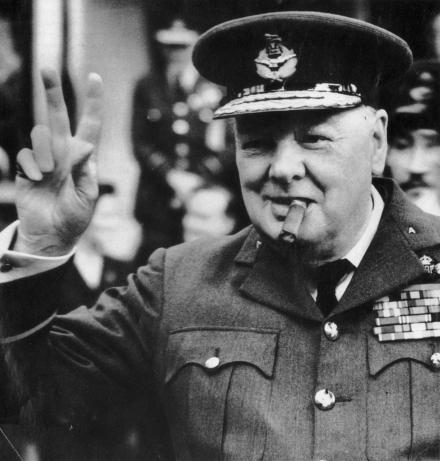The familiar face of Winston Churchill

The steady flow of new books about Winston Churchill should confirm that the famous wartime prime minister is now the best known and most studied figure in modern British history.
Churchill, a tireless self-promoter in his own time, would undoubtedly have taken a great deal of satisfaction from knowing that the legend he helped to craft would endure well into the twenty-first century. Unlike most politicians, he was deeply concerned with how he would be remembered – and judged – by history. And, although the verdict today is by no means universally positive, there is no doubt that he has achieved a level of fame that few can rival.
Academic historians (like me) spend so much time immersed in the study of the past that we cannot help but see it as a crowded place full of familiar faces. And a figure like Churchill is impossible to ignore: his memory, like the man himself, positively demands our attention. But the full-time historian is generally able to tune Churchill out when necessary: for most of us, he remains just one of the many historical actors we must look at to understand the past.
For the public at large, however, the past is a very different place. Most people approach it as they would a party full of strangers: instinctively scanning the crowd as they enter in hopes of spotting a familiar face. But the more time that passes, the more unfamiliar the past becomes – and the fewer faces we are likely to recognize. Our collective historical memory is subject to a natural sort of attrition process. Most of Britain’s leading politicians, statesmen and warriors of the early twentieth-century, many of them household names in their own time, are now barely remembered at all. Lord Kitchener’s famous recruiting poster from the First World War is still instantly recognizable, but every year there are fewer and fewer people who can put a name to the face of a man who in 1914 was better known – and certainly more widely admired – than Churchill.
The process has distinctly Darwinian overtones, as the most famous figures of yesteryear gradually displace their lesser-known rivals – and eventually each other – in the competition for a place in our collective memory of the past. Only a handful of famous twentieth-century Britons can share the historical stage with Churchill and demand anything like equal billing. And even they do not seem to share his seeming immunity to the passage of time. Neville Chamberlain, for example, remains an iconic figure, although for many he is not an important historical actor in his own right so much as a supporting figure in a better-known, and implicitly more important, story: Churchill’s triumphant rise to power in 1940.
Britain has good reason to look back on the Second World War as the “People’s War”, but the fact remains that only one of “the people” could be reliably identified today in a police line-up. And he is recognizable precisely because of his role in this great conflict. Churchill’s near-mythical status was ensured by his leadership in the critical months between the army’s evacuation from Dunkirk and the Royal Air Force’s victory in the Battle of Britain. At a time when Britain’s defeat seemed not only possible but imminent, Churchill rallied and inspired the people as no other contemporary politician could have. In Britain’s national mythology, he almost single-handedly changed the course of the war by sustaining the morale of the British people at the height of the Nazi onslaught, and in so doing ensured Hitler’s ultimate downfall.
Even in 1940, there was already a tendency to regard Churchill as the personification of Britain’s collective war effort and the embodiment of the nation’s heroic defiance of Nazi Germany. Churchill himself once attempted to put his role into perspective when he declared that “It was a nation and a race dwelling all round the globe that had the lion heart. I had the luck to be called upon to give the roar.” How far Churchill really believed this is debatable. In his speeches and memoirs he consistently downplayed the doubts and fears that pervaded Britain after the fall of France. But he knew better than anyone how close Britain may have come to a negotiated peace with Hitler in 1940 – and how important was his role in preventing this.
As more and more of Churchill’s contemporaries have receded and then disappeared from public memory, the popular association of Churchill with this defining moment in Britain’s history has only grown stronger. He may soon be, if he isn’t already, the last (recognizable) man standing in the history ofBritainduring the first half of the twentieth century.
Churchill believed that history was made by “great men”, and it is hard to imagine him being troubled by this trend. Historians might lament the public’s disproportionate interest in any one particular individual, but this is not to suggest we don’t need any more books about Churchill. The central place he enjoys in our memory of the twentieth century makes it all the more important that the record is as full and accurate as possible. The challenge is to populate that history with real people, and recognize that Churchill was also a supporting character in their stories.

